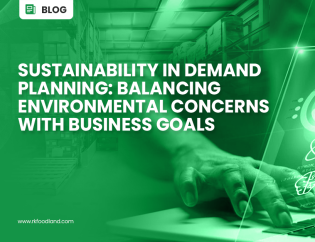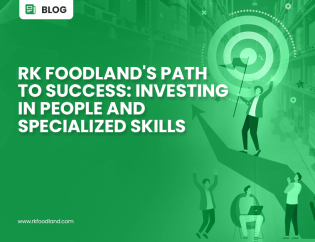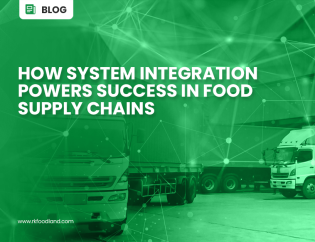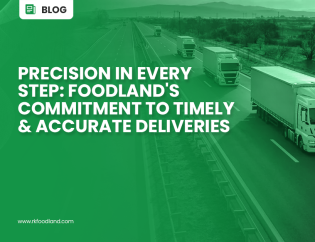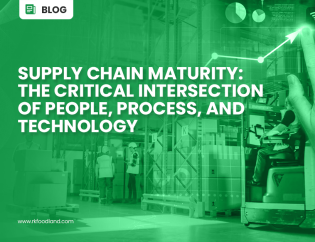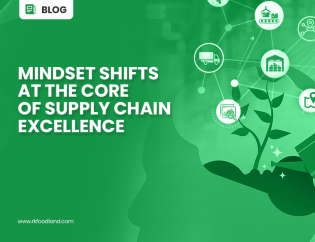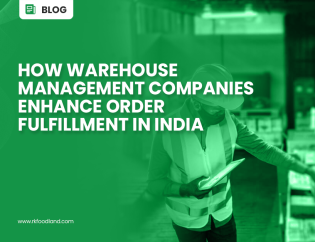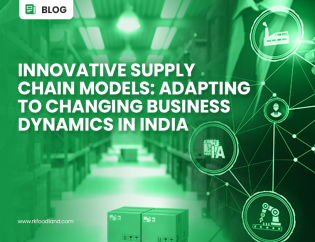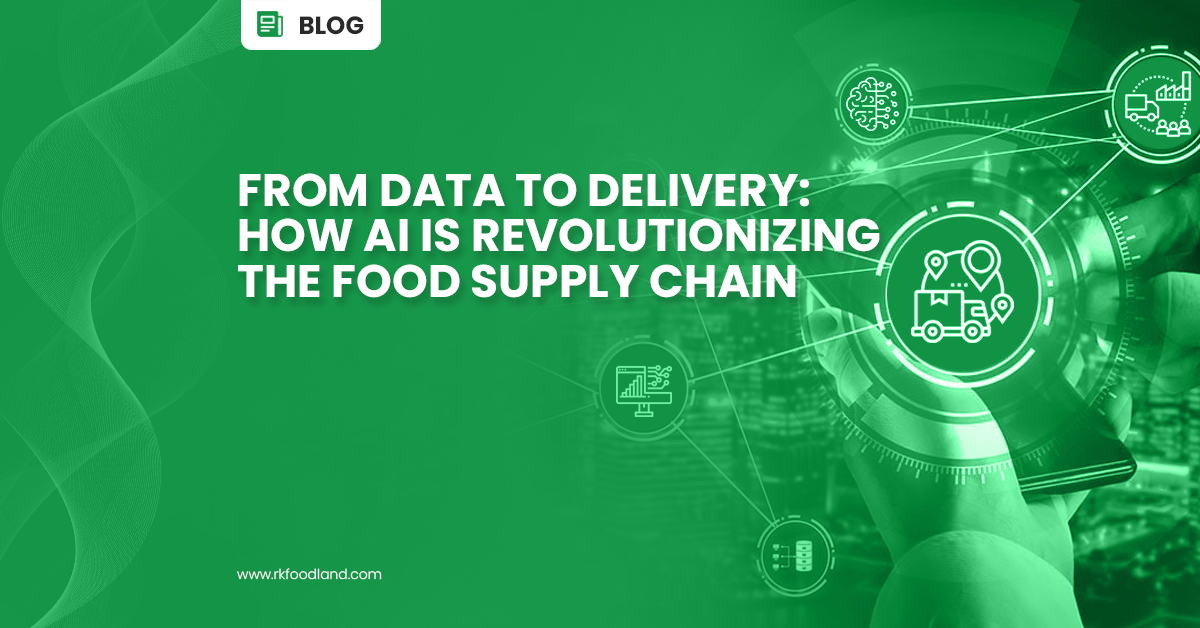
[Avg. Read Time < 5 mins]
In today’s dynamic and competitive food industry, staying ahead of the curve requires more than just keeping up with consumer preferences and market trends. It demands a deeper understanding of the intricate web that connects data, production, and delivery. From the growing influence of digital platforms to the increasing focus on sustainability and health-conscious choices, the food industry is in the midst of a transformation. At the core of this transformative revolution lies the immense power of artificial intelligence (AI) and data analytics. By effectively harnessing the abundance of available data and leveraging advanced AI technologies, companies are revolutionizing their supply chains and reshaping the entire landscape of food production, distribution, and delivery. Notably, within the food services sector, the implementation of artificial intelligence has the potential to elevate profitability by a staggering 74%, marking a significant opportunity for growth and optimization in the industry. In this blog, we will explore the fascinating journey from data to delivery and delve into how AI is reshaping the food supply chain, empowering businesses to adapt to changing consumer demands, optimize operations, and create a sustainable & customer-centric future.
Decoding Data for Strategic Advantage in the Food Supply Chain
In today’s fiercely competitive food industry, staying ahead of the curve necessitates a data-driven approach that embraces the power of AI. By leveraging AI and machine learning, businesses can unlock valuable insights and gain a strategic advantage. This transformative utilization of AI optimizes end-to-end supply chain efficiency and effectiveness. It enables accurate demand forecasting, streamlined inventory management, efficient supplier relations, and optimized warehouse operations. Additionally, AI brings predictability and traceability benefits while enhancing the customer experience through real-time order management and personalization. Approximately 51% of decision-makers across various industries utilizing AI agree that this strategic utilization of data provides a competitive edge, enabling proactive decision-making, enhanced efficiency, and cost-effectiveness. With AI-driven analytics guiding strategic decision-making and fostering prompt response for customer retention, the supply chain undergoes a remarkable transformation from supplier to customer, resulting in superior outcomes.
Role of AI in Crafting a Resilient and Sustainable Food Supply Chain
As resilience and sustainability get incredibly crucial for the food industry, AI emerges as a transformative force that can shape the future of the food supply chain. With its wide array of capabilities, AI has the power to revolutionize industry by enhancing transparency, reducing waste, and promoting responsible practices.
- One of AI’s key contributions is its ability to increase supply chain transparency, ensuring food safety and traceability. By leveraging Blockchain, businesses can track and monitor every step of the supply chain, from farm to plate, enabling swift identification and resolution of potential issues. Moreover, AI plays a vital role in waste reduction, optimizing production processes, and minimizing food spoilage through smarter inventory management.
- Another significant aspect of AI is its potential in fostering supply chain resilience. With its analytical capabilities and real-time data processing, AI enables businesses to quickly adapt to disruptions, whether it be sudden shifts in consumer demand or supply chain issues. By providing timely insights and decision support, AI empowers businesses to respond swiftly, mitigating risks and ensuring continuity. Notably, 50% of decision-makers acknowledge AI’s role in expediting problem resolution, while 42% recognize its potential for delivering personalized experiences. By harnessing AI’s capabilities, businesses gain a competitive edge in responsiveness and customer-centricity.
- Furthermore, AI holds immense promise in promoting sustainability throughout the food supply chain. By harnessing AI-driven resource optimization, businesses can actively mitigate their carbon footprint, minimize environmental impact, and make strides in responsible sourcing practices, as AI algorithms analyze extensive data to identify optimal transportation routes and streamline energy consumption.
Therefore, strategically adopting AI technologies is not just a business necessity but a decision driven by an intrinsic understanding of its advantages and the potential to shape a more sustainable and prosperous future for the food industry and our planet.
Leveraging Partnerships for AI Adoption: An Investment in the Future of the Food Industry
In a world driven by technological advancements, the food industry is witnessing a paradigm shift powered by Artificial Intelligence (AI). However, successfully harnessing the potential of AI goes beyond mere implementation; it requires forging strategic partnerships that fuel innovation and drive the industry forward. These strategic partnerships play a crucial role in facilitating widespread access to AI technologies, enabling businesses of all sizes to embrace and harness the transformative power of AI. By collaborating with technology providers or supply chain experts, food business CXOs and professionals in the food service industry can tap into a wealth of benefits. Partnering with established players in the field brings expertise, shared resources, and optimised costs, expediting the implementation process and minimizing risks. Moreover, strategic partnerships foster an environment of innovation, driving competitive advantage in the food industry. By pooling together diverse knowledge and perspectives, businesses can co-create solutions, experiment with cutting-edge technologies, and develop disruptive strategies to meet evolving consumer demands. However, the journey of forming successful partnerships also comes with its own set of challenges. It requires finding the right partners who align with the organization’s values, goals, and vision, ensuring a strong and mutually beneficial alliance. By investing in strategic partnerships, the food industry secures its place at the forefront of innovation, unleashing the full potential of AI and building a sustainable future where technology and culinary excellence converge to shape the food industry of tomorrow.
As we navigate through this transformative journey from data to delivery, it becomes increasingly clear that AI is not just a trend, but a game-changer in the food industry. It is revolutionizing the supply chain, making it more resilient, efficient, and sustainable. From predicting consumer behaviour to ensuring traceability and safety, from optimizing logistics to promoting sustainability, AI’s role is undeniably significant and far-reaching. However, fully realizing this potential requires strategic partnerships and continuous investments in technology. In an industry defined by razor-thin margins and intense competition, the right use of AI can be the deciding factor between thriving or merely surviving. So, as a Food Business CXO, we leave you with a critical question: Are you leveraging the full spectrum of AI tools to enhance your supply chain operations? To gain a more in-depth perspective on the AI driven supply chain of tomorrow, and to understand how you can harness this technology for your benefit, connect with the experts at RK Foodland.
Together, let’s shape the future of the food industry, one data point at a time.
Related Content | Foodland’s Resources
How The Food Industry Can Benefit From AI
How artificial intelligence is revolutionizing the food and beverage industry
Top 10 Ways AI is Revolutionizing the Food Industry
Scaling AI in the supply chain to improve intelligence
